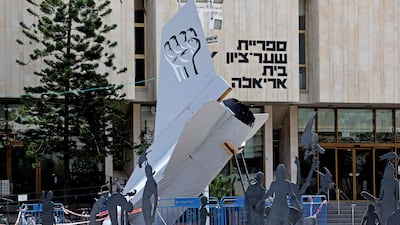Members of Israel’s anti-government protest movement have little faith the political dialogue over Prime Minister Benjamin Netanyahu’s contentious legal reforms will succeed and see an imminent return to mass demonstrations, analysts say.
In a desperate bid to stave off “civil war,” President Isaac Herzog is convening meetings between the government and opposition to try to find a compromise on the legal overhaul, which opponents say threaten Israeli democracy.
But Century Foundation analyst Dahlia Scheindlin told The National that “there are very high expectations of a very spectacular failure of these negotiations,” and that there is “less than zero trust between both sides”.
“Protesters feel jittery,” she said of the Israelis she had spoken to. “They are certain that the government is not negotiating in good faith … The overall problem of the overhaul package has been kicked down the line, probably very briefly.”
On Monday, Mr Netanyahu was forced to pause the reforms, which were on the brink of being approved, after around 700,000 Israelis took to the streets and the country's main union launched a general strike.
The government said it would revisit the plans when parliament returned for its summer session at the end of April, and that it would use the interim to find a compromise.
Joshua Hantman told The National that he is “not confident this period of negotiations will go anywhere,” and that the protests will likely continue “albeit with less energy”.
“If the talks fail and the government goes back to its extremist position, people will be back on the streets again,” the political consultant at the Number 10 Strategies communications and polling firm added.
He said the strike “scared the hell out of a lot of people,” adding that such an event “has not happened since the time of the British Mandate”.
Monday’s reversal by the government poses a particular problem for the prime minister.
Abraham Diskin, a research fellow at the right-wing think tank whose ideology was the basis of the legal reforms, told Bloomberg that “given what happened lately, politically and personally, there’s no question that [Mr Netanyahu] lost confidence”.
Polls released by separate Israeli television channels the same day the overhaul was paused showed plummeting ratings for the prime minister.
Mr Hantman said they were “particularly shocking,” because for the “past five election cycles we’ve seen almost a cult of personality around the prime minister.”
“That seems to be breaking now,” he said.

A further "lack of trust between the scattered groups that make up the protesters,” will also make finding a compromise on the reforms harder, says Ms Scheindlin.
“It is important to remember that these demonstrations are really not about the politics, and therefore opposition leaders are not seen as their spokespeople and representatives,” she added
For now fundamental questions remain, and there is little hope that Mr Herzog’s efforts can find answers.
Most people recognise that some type of reform is needed,” says Mr Hantman. “But this wasn’t a reform, it was a revolution.”















